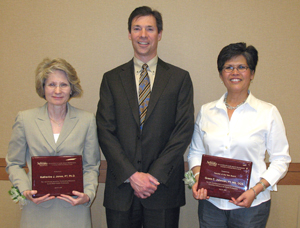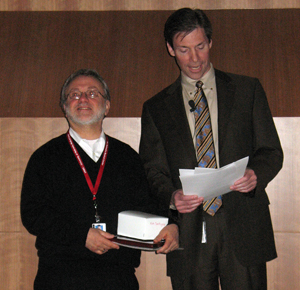 |
Associate Dean of the School of Allied Health Professions Kyle Meyer, Ph.D., center, with Katherine Jones, Ph.D., left, and Grace Johnson at the school’s recent annual awards ceremony. Dr. Jones received the school’s Oustanding Researcher Award and Johnson was named Allied Health’s Teacher of the Year. |
 |
Dr. Meyer presents Sam Cohen, M.D., Ph.D., with the school’s Oustanding Services Award. |
The awards were presented April 22 during SAHP’s annual Awards Ceremony.
Earlier in the day, 93 allied health students presented 72 posters for review during the Student Forum on Evidence-Based Medicine.
The 2009 awardees are:
Teacher of the Year Award — Grace Johnson, assistant professor, physical therapy education. Johnson provides nearly 300 classroom hours of instruction yearly in a multitude of courses. She is board certified for the Orthopedic Certified Specialist designation — less than 10 percent of all U.S. physical therapy practitioners achieve this status. Johnson was nominated to the Specialization Academy of Content Experts, which is an elite group that develops the national examinations for board certification in orthopedics.
Outstanding Researcher Award — Katherine Jones, Ph.D., assistant professor, physical therapy education. Since 2004, Dr. Jones has received research funding for TeamSTEPPS training (Team Strategies and Tools for Enhanced Performance and Patient Safety) through the Agency for Health Care Research and Quality, as well as Health and Human Services / Health Resources and Services Administration funding. Her work has a significant impact among rural Nebraska critical access hospitals in identifying problems and improving safety and teamwork.
Outstanding Service Award in SAHP — Sam Cohen, M.D., Ph.D., Havlik/Wall Professor of Oncology in the College of Medicine department of pathology/microbiology. As chairman of the department from 1992 to 2007, Dr. Cohen contributed in significant ways to the development of the clinical laboratory science education and cytotechnology education programs. He hosted more than 150 students in The Nebraska Medical Center clinical laboratory for which he was responsible. He made new technologies available for training, and he developed innovative research opportunities that directly benefitted students in the clinical laboratory.